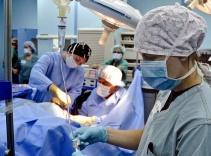Employers and Universities: Work with us?

60 Second Interview: Surgeon
When you face issues with your health, doctors are on hand to diagnose the problem and prescribe the treatment that you need. When the problem is inside your body, you may need the help of a surgeon - a specially trained doctor - who will operate on you to diagnose or fix whatever has gone wrong. It's in our list of the ten greatest jobs.
Kinner, who specialises in trauma and orthopaedics, tells us what his job involves and how to become a surgeon.

Name: Kinner Davda
Company: NHS
Industry: Medicine -Trauma and Orthopaedics
What is your job: Specialist registrar surgeon
How long have you been doing this job: I've been working in medicine for 10 years
University: Nottingham
Degree Subject: Medicine
A-Levels: Biology, chemistry, maths
Interests: Reading, food, comedy, photography, keeping fit
What was your very first job?
I worked for my father as a cashier in our shop. I was initially paid in sweets and chocolate, but having realised that I was eating all the profits, my father gave me a handsome wage of £1 per hour.
What made you want to do your current job?
I was interested in a career in science, plus I wanted to help people and have a stable lifelong career that offered the ultimate job satisfaction.
How did you get there?
First off, I studied maths and science subjects at school. At university I studied for a degree in medicine to qualify as a doctor, which took five years and included lots of time doing placements in hospitals. I then spent a further two years training as a junior doctor in different hospitals before deciding to specialise in orthopaedics (bones and bone surgery), which took a few more years training after that. I have worked for the NHS the whole time.
What is a typical day at work like?
The day begins with a morning meeting at 7.30am where we discuss the patients with broken bones admitted through the emergency department. From 8am to 9am, we do a ward round, checking on patients that have had surgery, or will be having surgery that day. We ensure they have had no complications from surgery and are on the road to recovery.
The rest of the day will be spent either in the outpatient department or the operating theatre. The day is intensive and always busy. There isn’t much time for a lunch break. I normally finish around 6pm. If I am on call, I will see patients in the emergency department until the late evening.
What’s the best thing about your job?
As a surgeon it's the variety of clinical problems I encounter; the satisfaction and thrill of surgery; and the patients I meet and the staff I work with. We all work toward a common goal of improving the lives of our patients.
What is the most challenging thing about your job?
Things could be better organised at the hospital, especially using the money and resources that are available properly.
How have things changed since you first started working in this industry?
The working hours have reduced dramatically, particularly for junior doctors.
What advice do you have for people who want to do become a surgeon?
Medicine is extremely rewarding, however it takes a huge amount of commitment, both with your time and money, as it is a long undergraduate degree. Take time to understand all of the different areas of medicine to make sure you pick the right career for you.
What things do you wish you'd known before starting your career?
Medicine is a game of stamina, It’s more of a marathon than sprint. It requires an a lot of dedication and hard work not just through university, but also up until you reach consultancy. There are many exams both at undergraduate and postgraduate level; the long days and on-call shifts can disrupt your social life and your family life.
I wish I had known the lifestyle before I had started. However, there are other branches of medicine such as general practice where you can choose the hours you work. Before choosing a medical career, I would advise spending time in doing plenty of work experience in medicine and other careers that may interest you.
For more information on how to become a surgeon, check out our medicine & healthcare career zone.
